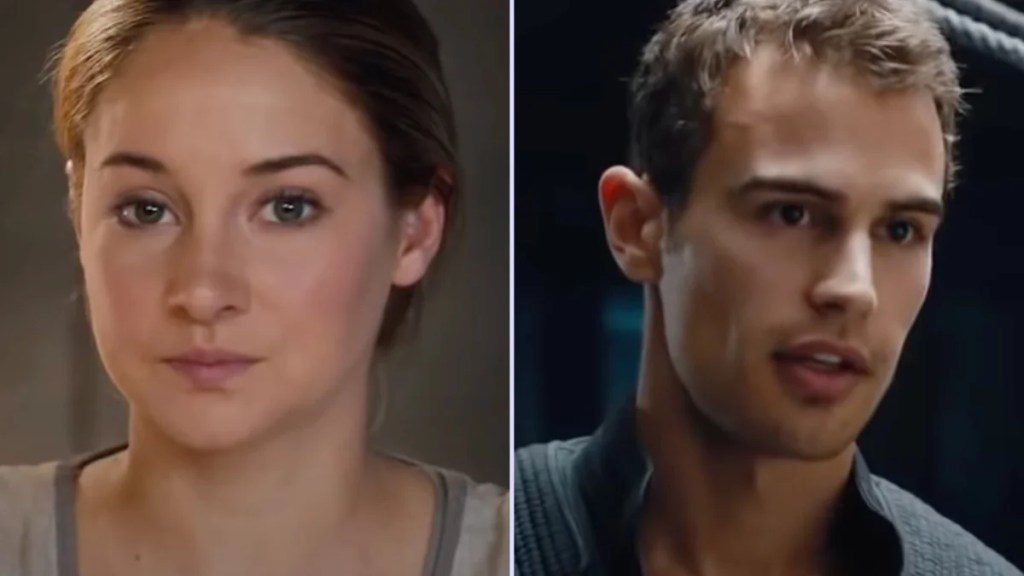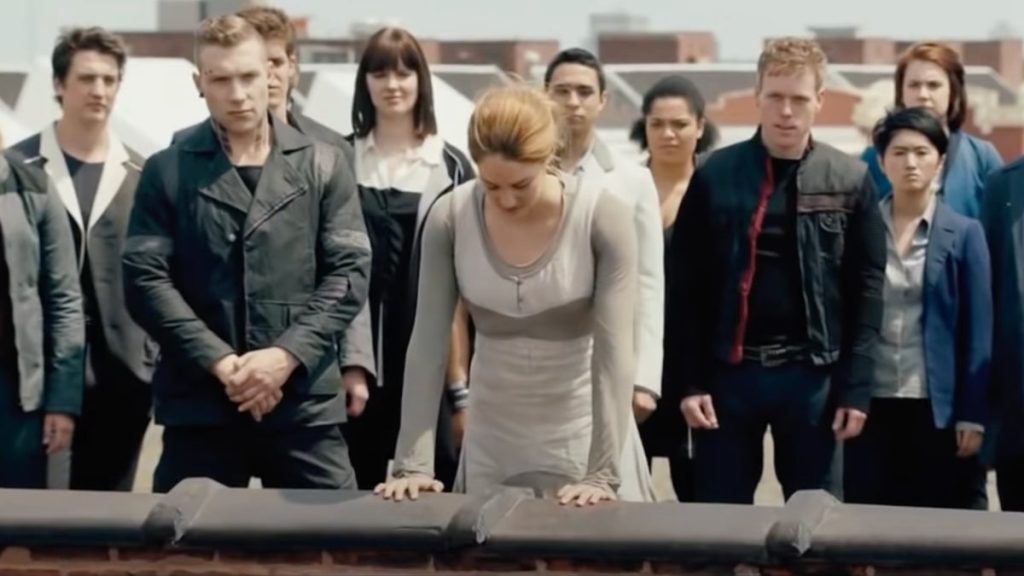It’s been a decade since the first “Divergent” movie came out, bringing author Veronica Roth’s idea of a society divided into groups to the big screen. “Divergent” was one of the initial post-apocalyptic YA series to come out following the success of “The Hunger Games.” Summit Entertainment even doubled the film’s budget after seeing how popular “The Hunger Games” was.
“I felt pressure as a filmmaker to make a meaningful impact and create something unique. There were a lot of things I wanted to do with it,” director Neil Burger said in an interview with TheWrap reflecting on the film's creation.
Shailene Woodley was chosen to play the main character Beatrice Prior, a 16-year-old girl about to take a test to determine which of the five factions she would live in. Theo James, known for his role in the “Underworld” series, was cast as the romantic lead Tobias “Four” Eaton.
The rest of the cast included future stars like Zoe Kravitz, Miles Teller and Ansel Elgort, and Burger also brought in Oscar-winner Kate Winslet to play the film’s villain. Despite the success of the 2014 film, earning nearly $300 million against a budget of $85 million, the “Divergent” series ended prematurely before its conclusion.
Burger reflects on the creation of the first film, the decisions he made to set it apart, assembling the cast, and his decision not to direct the sequel “Insurgent” because it seemed like a risky move.
This interview has been edited and condensed for clarity.
Similar to “The Hunger Games,” “Divergent” followed the story of Beatrice Prior, a sixteen-year-old girl about to take a test to determine which faction she would live in. From a faction focused on selflessness, Beatrice struggles with her desire to please her parents versus choosing bravery.
Director Neil Burger looked back on making the first film in a trilogy over Zoom in February, discussing his approach to creating a realistic future world and the competition from “The Hunger Games” and the rise of young adult dystopia.
“I felt pressure as a filmmaker to make a meaningful impact and create something unique. There were a lot of things I wanted to do with it,” Burger told TheWrap. For instance, we filmed in Chicago, where the story is set, and I wanted to avoid using computer-generated landscapes. We made a lot of changes, but we captured real-life scenes on the streets of Chicago and in natural sunlight as much as possible. My rule was that 80% of everything on screen had to be real.”
Burger thought that the cast being in real locations with their feet on the ground was achieved and he believed that sticking to that principle could still happen today. He was initially drawn to the project because of its themes of herd mentality versus individual identity.
He said he was interested in creating a world and was attracted to the themes of the movie, particularly the concept of factions and the struggle between staying true to oneself or conforming to the group. He also pondered on the idea of being able to change and break away from innate traits.
Burger also revealed previously unknown details about the film's production and the fate of the franchise.
TheWrap: The budget was reportedly doubled based on the success of The Hunger Games. What was it like working with the studio on this?
Burger: I believe the initial budget was $40 million. Then, it was doubled after the success of ‘The Hunger Games’ as the studio thought our film could also achieve similar success. We ended up with double our original small budget.
What can you recall about the casting process? Was there fierce competition? I know you had your eye on Shailene Woodley.
We were searching for someone who was meant to be 16. In the book, the initiates are 16, but we changed it to 18 for our benefit. After watching “The Descendants,” I thought, “She's the one.” Shailene had an authentic quality and a rebellious energy, which I wanted even though her character started off mild but transformed into a badass. I had her in mind from the start, and we managed to cast her.
I'm particularly proud of the rest of the cast. We have Miles Teller and Ansel Elgort, who was in his second movie, and finding Theo James was fantastic. He’s like a mix of Paul Newman and Bruce Lee. He’s fantastic for the role, and of course, Kate Winslet.
What was it like when you finally got Kate Winslet for that role?
We wanted someone with personal charisma and power. She plays a character that's powerful yet manipulative, and she's kind in many parts of the movie to Tris, but it's all part of a plan. So, we were fortunate to cast her.
The interesting thing about having her at that time and her performance, she was five months pregnant. She wasn’t portraying a pregnant character, so we had to use strategic costumes and shooting techniques to hide her baby bump. She did great. Although she wasn’t in action scenes, there were moments where she was pulled and pushed, and I remember Theo grabbing her once, and he was never one to hold back. It was like, ‘Whoa, whoa, whoa, she’s five months pregnant.’ She was wonderful and fully committed to the role.
What can you recall about leading ‘Insurgent’ after ‘Divergent’?
I didn’t direct ‘Insurgent.’ I was unsure whether I wanted to do another one or not, and I ultimately chose not to. It was a difficult decision because I really loved the cast. The books were challenging to adapt, and it was a lot of work to make ‘Divergent’ true to the book, even though it closely followed it. 'Insurgent' faced the same challenges. 'Divergent' was released in March, and we were supposed to start shooting 'Insurgent' in June for a March 2015 release. The script wasn't ready, and I thought it might lead to problems.
It seemed like the third book hadn’t been written yet at this point, but you had spoken to Veronica Roth about the ending of the series. Did you know that Tris ultimately died?
I think I did know that, yes. I do remember that. I remember her telling me a little bit about [the ending], which was informative, because you want to know what you’re setting up. We were working on this movie that was supposed to be a trilogy, and so what you’re laying out in the first film is obviously going to pay off in the last one, but the last one wasn't written yet. I think she had written it or was polishing it. You want to get it right that you’re not setting up somebody — their character — to be a certain way [if] they were going to be the same in the third one, because you want to have a change or whatever it is. I was trying to get as much information out of her as possible.

Did you see “Insurgent” and “Allegiant”? How do you feel about the way the franchise ended?
I did see them because they were my friends making those movies and they would call me during the shooting of them. I wanted to have a very stripped-down futurism, like, where are they getting their materials? If they have a gun, they’re having to manufacture their guns with whatever materials they have. They’re in this walled city without any kind of communication or trade with the outside world. So where are they getting their parts for these guns, for example, or for their vehicles? I wasn’t looking for a steampunk sensibility, but I was looking for our own version of that where they were reusing things. What did their fighting style develop from? and where were they getting their power? I was trying to have that all be as logical and real as possible whereas I think in the next ones, they just decided, ‘We don’t care about that. Let’s just have it be as cool as possible and space age. It’s the future,’ weird shapes to things, and that’s great too, but I had a very rigorous way that I wanted to go about it.
There were plans for an “Allegiant Part 2,” (“Ascendant”) but that didn’t happen. Were you a part of that conversation?
I advised them to just do one. There’s three books, do three movies. ‘The Hunger Games’ had split the last one into two and ‘Harry Potter’ had split the last one into two parts. I don’t want to say they got greedy, and I was like ‘You got this, it’s good. Just finish it off while you can, while you have the actors all together and things like that. So that was my advice to them, but they chose to split it in two.
And she resides at the end of “Allegiant.” Returning to the popularity of dystopian stories in the 2010s, do you think that trend could make a comeback?
I suppose so, but if we look at ‘The Last of Us,’ there's dystopia everywhere, right? It has become our favored genre. I believe it has greatly influenced people, especially the youth, like, ‘Wow, that’s where the future is headed. Everything's going to chaos.’ It presents a very negative view of the future, which has had a significant impact.
Conversely, there may be fewer YA movies now, but they once resonated and those young adult tales, in a sense, they are relatable. They involve issues of identity and the challenge of being different in a world where everyone is the same. ‘Do you try to blend in? Do you conceal who you truly are, or, if you're true to yourself, what's the price? These are universal concerns, whether you're young or an adult.
I'm not sure if you've read “Fourth Wing,” but it’s a series about dragon fantasy, and the Rider’s Quadrant seems similar to Dauntless. They also have their own form of corrupt government. Why do you think we still return to these themes?
It's always about ‘Where do I belong? Am I a jock or a nerd?’ or, in the adult world, ‘Am I a business person or an artist?’ People take those classic labels and, in the case of ‘Divergent,’ it was virtues —bravery, kindness, selflessness. I think it’s a way to delve into human nature and that’s ultimately what “Divergent” is about. It’s an exploration of human nature and the question of whether we can coexist, because in a way, they seem to have established a society at the start of the movie where everything’s running smoothly, and it's like, ‘Can we coexist? Or are we always going to be at odds with each other?’



